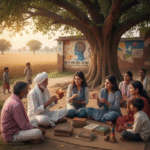New Delhi, 2025 — In India’s vibrant and diverse political landscape, conservative values play a significant role in shaping the nation’s democratic framework. Advocates argue that these values—emphasizing tradition, social stability, and respect for established institutions—contribute positively to the governance and societal harmony of the world’s largest democracy.
Foundations of Conservative Philosophy in India
Conservative thought in India is rooted in a deep respect for the country’s rich cultural heritage and historical continuities. This philosophy underscores the importance of family, religious traditions, and national pride as pillars that stabilize society and govern moral behavior.
Conservative Values and Democratic Governance
- Emphasis on Social Stability Conservative values advocate for social cohesion and stability, which are seen as essential for a functioning democracy. By promoting family values and community respect, conservatism aims to foster a society where individuals feel connected and responsible not only for themselves but for the larger community.
- Support for Established Institutions A key aspect of conservative ideology is the support for established institutions, such as the judiciary, the educational system, and religious organizations. Conservatives argue that these institutions are crucial in maintaining law and order and imparting moral values, thus supporting the democratic fabric of the nation.
- Economic Prudence Fiscal conservatism, a principle that advocates for minimal government spending and low taxes, is also a significant aspect of conservative values in India. Proponents believe that economic prudence is essential to India’s long-term prosperity and stability, ensuring that the government does not overextend itself and maintains sufficient reserves for future generations.
Challenges and Critiques
While conservative values contribute to certain aspects of Indian democracy, they also face criticism for potentially stifling progress and inclusivity. Critics argue that an excessive focus on tradition might hinder social reforms and the rights of marginalized communities. Furthermore, the emphasis on religious and cultural homogeneity could undermine India’s inherently diverse and pluralistic society.
Conservative Values in Modern Indian Politics
In recent years, conservative parties and groups have gained significant influence in Indian politics, advocating for policies that reflect their ideals. This has led to vigorous debates about the direction of Indian democracy and the balance between preserving traditional values and embracing modern liberal principles.
Global Context and Implications
India’s approach to conservative values within a democratic framework provides an interesting contrast to global trends, where conservatism often takes different forms. In India, these values are intertwined with the nation’s struggle for independence and its post-colonial identity, shaping a unique political discourse that influences both domestic policies and international relations.
Conclusion
Conservative values undeniably play a crucial role in supporting Indian democracy by promoting stability, respect for established institutions, and fiscal responsibility. However, the challenge lies in balancing these values with the need for progressive change and inclusivity, ensuring that India’s democracy remains both vibrant and resilient. As India continues to evolve, the interplay between conservative and liberal ideals will likely remain a central theme in its democratic journey.














